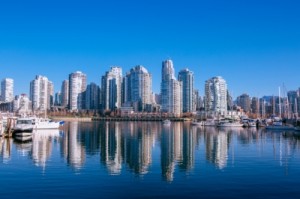British Columbia Launches new Registration System for Immigration to Canada Through BC PNP
 The province of British Columbia (B.C.) has launched an innovative new points system for immigration to Canada through the British Columbia Provincial Nominee Program (BC PNP). The Skills Immigration Registration System (SIRS) will be used for prioritizing newcomers through most BC PNP categories and fast-tracking their arrival to the province.
The province of British Columbia (B.C.) has launched an innovative new points system for immigration to Canada through the British Columbia Provincial Nominee Program (BC PNP). The Skills Immigration Registration System (SIRS) will be used for prioritizing newcomers through most BC PNP categories and fast-tracking their arrival to the province.
In addition, the government of B.C. has asked the federal government for a significant boost in the number of immigrants who can come to the province through the BC PNP. The province is asking for its allocation to be increased from 5,500 to 9,000.
The SIRS:
- Operates on an Expression of Interest (EOI) / Invitation to Apply (ITA) model;
- Is aligned with British Columbia’s labour market and development priorities;
- Comes into effect immediately;
- Prioritizes candidates who have obtained a job offer from a B.C. employer;
- Is used for portions of the BC PNP Skills Immigration and Express Entry streams;
- Benefits individuals with previous work experience in Canada;
- Brings into play factors that are not typically seen in other points systems, such as the skill level, wage rate, and location of the job offer; and
- Guarantees an ITA to individuals who are awarded a certain number of points.
Why the SIRS?
The government of B.C. has been quick to point out the rationale behind the new system, with Minister of Jobs, Tourism and Skills Training and Minister Responsible for Labour, Shirley Bond, stating that “We need to bring high-demand skilled workers and investment-ready entrepreneurs to B.C. to continue to grow our diverse economy.”
“We’ve heard from the businesses that are helping drive our economy to be the best in Canada. They tell us that having immigration programs be timely and efficient to bring the right people into B.C. is what they need to keep their businesses growing.
"And for those skilled immigrants applying to the BC PNP, they need a transparent system that’s easy to understand and gets them working in B.C. as soon as possible. Our government believes the targeted changes we’ve made to the BC PNP will keep our economy moving forward."
How does the SIRS work?
Following the implementation of other EOI systems across the Canadian immigration landscape, B.C.'s SIRS system gives candidates a registration score that determines whether they are invited to apply.
Once a candidate submits a registration through SIRS, he or she will receive a registration score and will be entered into a selection pool for the category in which he or she has registered (candidates may register under one category only). The registration, which is free of charge, will remain in the selection pool for a maximum of 12 months from the date of submission.
Periodically, the BC PNP will invite the highest-scoring registrants from each category to apply for provincial nomination.
Which BC PNP categories are covered by the SIRS?
Registration under the SIRS is mandatory for certain BC PNP categories, some of which fall under Express Entry B.C., British Columbia’s enhanced immigration stream that is dedicated to nominating candidates who are eligible to enter the federal Express Entry pool. Upon submission of their application at the federal level, these candidates benefit from processing times of six months or less.
The SIRS is also used for certain categories that fall under the BC PNP Skills Immigration stream, a ‘base’ stream. Candidates who receive a base nomination have their applications processed outside Express Entry. The route from a successful BC PNP base nomination to permanent residence is a two-step process. Candidates must first satisfy the criteria for the stream, apply, and receive a nomination certificate. Next, with this certificate in hand candidates may apply to the federal government, which will oversee the necessary medical and security background checks before granting permanent resident status.
To learn more about base and enhanced provincial nomination, click here.
Candidates under the following categories are assessed and prioritized under the SIRS:
- Skills Immigration – Skilled Worker
- Skills Immigration – International Graduate
- Skills Immigration – Entry Level and Semi-Skilled
- Skills Immigration – Northeast Pilot Project
- Express Entry B.C. – Skilled Worker
- Express Entry B.C. – International Graduate
Candidates eligible under one of the following categories do not need to register under the SIRS and may apply directly to the BC PNP:
- Skills Immigration – Health Care Professional
- Skills Immigration – International Post-Graduate
- Express Entry B.C. – Health Care Professional
- Express Entry B.C. – International Post-Graduate
The only exception to the job offer requirement under the BC PNP is if the candidate has a graduate degree from a B.C. university in the natural, applied or health sciences. However, candidates under this International Post-Graduate category do not register under the SIRS.
To learn more about eligibility requirements for the various BC PNP streams and categories, click here.
How can I determine my score under the SIRS?
While the scoring system may appear relatively straightforward on first viewing, there are in fact certain complexities across the factors. Of the 200 points available, 120 are for economic factors and 80 are for core human capital factors. The SIRS points system, however, awards bonus points (within the total of 200) for a range of factors relating to a candidate’s job offer, education history, and previous work experience.
To assist potential candidates for immigration to Canada through the BC PNP, the experienced IT team at CanadaVisa.com has developed an exclusive SIRS Calculator. By answering a few simple questions, users are able to determine what their score might be if they were to register under the SIRS.
One of the positive upsides for candidates who register under the SIRS is that individuals who achieve or exceed the following registration scores for their chosen category will be guaranteed an ITA in the next draw following their registration. Candidates are not required to meet the threshold for their category in order to receive an ITA; candidates may be selected with a score lower than the score listed for their category below.
Category |
Guaranteed ITA points threshold |
Skills Immigration – Skilled Worker |
135 |
Skills Immigration – International Graduate |
105 |
Skills Immigration – Entry Level and Semi-Skilled |
95 |
Skills Immigration – Northeast Pilot Project |
95 |
Express Entry B.C. – Skilled Worker |
135 |
Express Entry B.C. – International Graduate |
105 |
A target to aim for
“One of the more frustrating aspects of other Expression of Interest systems used for the purposes of immigration to Canada, such as Express Entry, is that candidates do not have a defined points target to reach for. While educated guesswork based on previous draws may help, candidates cannot be sure what the points requirement for the next draw might be,” says Attorney David Cohen.
“This new system from British Columbia, however, presents potential candidates with a target to aim for. Moreover, these targets for specific categories are very much reachable.
“British Columbia is projected to have the highest job and population growth of any Canadian province over the coming years, with around one million new openings expected before 2022. The government of British Columbia has taken the correct measures to ensure that the province is using its PNP in a dynamic and responsive way. One example of this is by opening registration under the SIRS to individuals who obtain job offers in semi-skilled positions, as well as those who have job offers in skilled positions.”
To find out if you are eligible for any of over 60 Canadian immigration programs, including the British Columbia Provincial Nominee Program, please fill out a free online assessment today.
British Columbia profile
Population: 4,667,000 (January, 2015)
Largest city: Vancouver
Capital city: Victoria
Official language: English (de facto)
Economy: B.C. has the highest percentage of service industry jobs in Western Canada, comprising 72% of industry. The largest section of this employment is in Finance, Insurance, Real Estate and Corporate Management. Many areas outside metropolitan areas, however, are still heavily reliant on resource extraction. GDP per capita is CAD $50,121 (2013).
Location: West coast of North America. The Canadian province of Alberta is to the east, the states of Washington and Montana (U.S.) lie to the south, the Pacific Ocean and the state of Alaska (U.S.) lie to the West, and the Canadian territories of Yukon and Northwest Territories lie to the north.
Climate: The coast, as well as Metro Vancouver and certain valleys in the south-central part of the province, experience mild weather, encouraging outdoor recreation and long growing seasons. The interior has some of the warmest and longest summer climates in Canada. Colder climates, similar to other regions of Canada, are found in the central and northern areas of the province.
© 2016 CICNews All Rights Reserved
- Do you need Canadian immigration assistance? Contact the Contact Cohen Immigration Law firm by completing our form
- Send us your feedback or your non-legal assistance questions by emailing us at media@canadavisa.com




